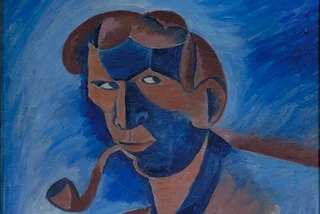“The Bible says you cannot pour sweet and bitter water from the source. So the issue of identity simplifies freedom of choice,” Moldovan-born painter Alexander Tinei tells Expats.cz. While Tinei’s works have been part of dozens of solo and group projects, the current exhibition at Prague’s DOX Art Center, called “Funny Games,” is his biggest solo exhibition to date, and also his first museum solo show.
A figurative painter born in the small Moldovan town of Căușeni, then part of the Soviet Union, Tinei studied at the Chișinău Repin State College of Fine Arts, then settled in Budapest in the early 2000s, where he honed his craft.
PARTNER ARTICLE
“Only when I went to Budapest at the age of 30 did I discovered that I knew nothing about contemporary art,” he said in an interview with Gallery Viewer. “We were still educated with the knowledge and skills of the late 19th and early 20th centuries,” he added.
Some of the paintings in the current exhibition bear subtle traces of Tinei’s origins, such as the “Music Teacher,” which shows a middle-aged accordion player whose old-fashioned hairstyle is sure to bring back memories for those who grew up in Eastern Europe. Others have the intimate feel of diary entries, documenting fleeting moments of existentialist questioning – or merely being present in one’s surroundings.
Tinei told Expats.cz that the exhibition brings together works created between 2009 and 2014 that are part of collections in Prague and Budapest. “I was astonished to notice that the works are still relevant and speak to the viewer,” Tinei says, adding that he finds it “valuable” to gauge the public’s reaction to his works.
Identity and blue lines
The running threads connecting his early paintings are literal blue lines, akin to veins and roots. Most of his subjects are young, with a vulnerability enhanced by the stark backgrounds; some of them are half-undressed, and captured mid-gesture in a state of fragility. Later works are more abstract, losing their Polaroid-like quality for elaborate backgrounds coming together out of blocks of primary colors.

Alexander TineiThe questions about what to do, or what profession to choose, follow from the understanding of who you are. Self-determination is crucial in matters of good and evil, war and peace, weakness and strength, kindness and callousness.
Tinei said that, in his opinion, “the main problem for young people is self-determination,” given that, if they don’t figure out the course of their age early on, they risk having dissatisfaction pursue them throughout their lives.
Virtual immersion in the heart of darkness
While Tinei’s paintings are large-scale depictions of the fragilities of his models, the movie “Tmání” (Darkening), directed by Ondřej Moravec, designed by Bára Anna Stejskalová and produced by Hana Blaha Šilarová, uses virtual reality to show viewers what it’s like to live with depression. More importantly, the medium turns viewers into active participants, who can scream, shout, and whisper to interact with the surroundings.

The journey, which starts in a crumbling town, sees main character Ondřej acting as a modern-day Virgil to the viewer’s Dante, guiding us through a deep, dark forest that gets lighter and brighter as we learn more about Ondřej’s backstory, and interact more actively with the surroundings. In the words of its creators, “the film allows you to experience and understand for a moment what it is like to live with this illness, and what mechanisms people with depression can use to feel better.”
This uncanny experience – although you are placed in a separate cubicle with a virtual reality headset, it is difficult at first to overcome the fear that others hear you – is as cathartic as a therapy session.
Seemingly dissimilar, both “Funny Games” and “Darkening” offer unusual and through-provoking takes on what goes on behind the surface of everyday life – as well as a glimpse on what it takes to brighten the darkness.
The exhibition Tmání (Darkening) runs until Feb. 12, and Funny Games until Mar. 19, both of them at the Dox Art Center.












 Reading time: 3 minutes
Reading time: 3 minutes 
























